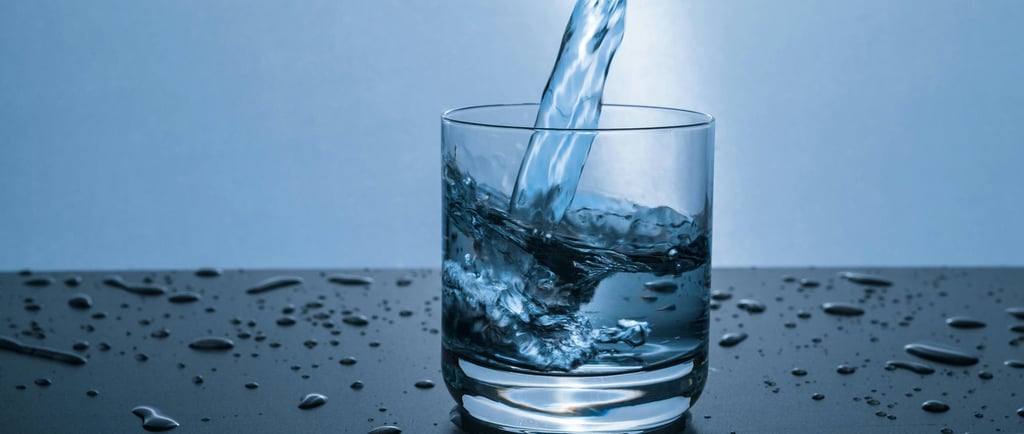Hydration: Why it Matters and How to Stay Properly Hydrated
Feeling sluggish? Headaches? Your hydration might be the key! 🚀 Learn the vital role water plays in your body and practical tips to stay properly hydrated for optimal energy and well-being
Written by Juergen George, BSc Biotechnology
6/8/20252 min read


Hydration refers to maintaining an adequate level of water in the body to support essential biological functions. Water is fundamental to health: about 60% of your body is composed of it.
Key organs have even higher percentages:
· Brain: 73%
· Heart: 73%
· Lungs: 83%
· Muscles and kidneys: 79%
· Skin: 64%
· Bones: 30%
In short: stay hydrated.
It is generally recommended to drink about 8 glasses of water per day (roughly 2 liters), but actual needs vary based on several factors.
The Importance of Hydration
Hydration affects nearly every aspect of bodily function:
· Joint health: Lubricates joints and reduces pain.
· Saliva and mucus production: Aids digestion, protects tissues, and prevents tooth decay.
· Oxygen delivery: Blood, largely composed of water, transports oxygen.
· Skin health: Improves skin barrier function and prevents dryness.
· Cushioning sensitive tissues: Protects the brain, spinal cord, and promotes mental clarity.
· Body temperature regulation: Maintains normal temperature through sweat.
· Digestive support: Prevents constipation and digestive discomfort.
· Waste elimination: Facilitates the removal of waste via urine, sweat, and feces.
· Blood pressure regulation: Prevents blood thickening and associated issues.
· Respiratory health: Keeps airways open, minimizing asthma and allergy symptoms.
· Nutrient transportation: Distributes minerals and vitamins.
· Kidney health: Reduces the risk of kidney stones.
· Exercise performance: Enhances endurance and reduces dehydration-related fatigue.
· Weight management: Promotes satiety and reduces reliance on sugary drinks.
· Hangover prevention: Alternating water with alcohol intake reduces adverse effects.
Dehydration: Causes, Signs, and Effects
Dehydration occurs when the body lacks enough water to maintain normal function.
Common causes include:
· Diarrhea
· Vomiting
· Excessive sweating (due to exercise or heat)
· Inadequate water intake
· Certain medications (diuretics)
Signs of dehydration:
· Dark yellow urine
· Thirst
· Dry skin and chapped lips
· Constipation
Effects of dehydration:
· Headaches
· Electrolyte imbalances
· Dizziness or lightheadedness
· Fatigue and weakness
· Muscle cramps
· Severe cases: kidney damage
Overhydration: A Rare but Real Risk
Overhydration happens when water intake overwhelms the body's ability to remove it. Although rare, it can occur due to:
· Chronic alcohol overconsumption
· Drinking excessive amounts of water rapidly
· Kidney problems
Signs of overhydration:
· Swelling, particularly in the legs
· Frequent urination
· Hyperventilation
· Excessive sweating
How to Stay Hydrated
While water doesn't contain calories or nutrients, it remains essential for nutrition and overall health.
General guideline:
· Aim for at least 2 liters (8 glasses) a day, adjusting based on gender, weight, activity level, and climate.
· Consult a healthcare professional for individualized recommendations.
Hydration hacks:
· Drink herbal teas (caffeine-free, sugar-free)
· Keep a reusable water bottle nearby (preferably not plastic)
· Drink water first thing in the morning
· Flavor your water naturally with lemon, cucumber, ginger, or chia seeds
· During intense exercise, consider sports drinks with electrolytes
· Always have water at your workspace
· Eat high-water-content foods like cucumbers, melons, soups, and leafy greens
Tip:
· Try to consume most of your fluids earlier in the day to avoid disrupted sleep from nighttime bathroom visits.
Key Takeaways
· Hydration is crucial for maintaining internal health and digestion.
· Drinking water isn’t the only way—explore teas, hydrating foods, and flavored waters.
· Both dehydration and overhydration can be harmful. Find your balance.
You may also want to read:
Ten Myths about Nutrition - Debunked
Ways to Lower Blood Sugar Levels.
Disclaimer
The information provided here is for educational purposes only and should not replace direct medical advice from a qualified healthcare professional.